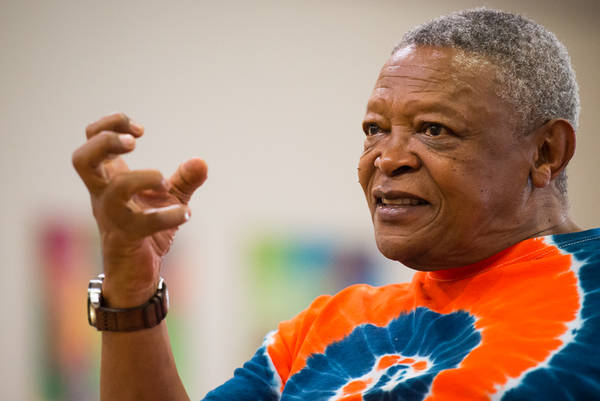Saturday
04. 07. 2015
LATEST NEWS
- 10. 07. 2015
Echoes of love in the rain - 08. 07. 2015
The global phenomenon of the Brazilian samba - 07. 07. 2015
Clowns, rabbits, fish and other windows to the world - 06. 07. 2015
Unstoppable Riblja Čorba
The indefatigable musical activist on the stage at Minoriti
Saturday
04. 07. 2015
On 4th of July at 10 p.m. the first name of African music, South African trumpeter Hugh Masekela, is to stand on a stage in Slovenia, that is why his concert on the Zavarovalnica Maribor stage will be something really special. Always in good mood, and despite his 76 years still in great shape, he is very looking forward to his first Slovenian performance. „We will play some of our most popular songs which people all around the world love to hear and sing with us. For example, Stimela, the hit Grazing in the Grass, Lady by Fela Kuti and Bring back Nelson Mandela. We will combine them with some of our less known ones,“ he announced their evening repertoire.
"We have an excellent band. The group following us always has very demanding work to do,“ he smiled. He has been playing with this cast for ca. 5 years, and says they get along very well: „The group is now very relaxed and greatly harmonized, and people all around the world notice that.“ He is staying true to his African roots and despite numerous musical influences during his 60-year-long career, Masekela says: "We play African music, that’s all we know. But I think it’s the widest combination of different music from our continent since Miriam Makeba. We play stuff from Congo, Nigeria, the South African Republic, activist songs from the times of the fight against apartheid.“ The contact with the audience is very important and this is why he puts a lot of energy into the communication with his listeners, and encourages them to sing with him. „You don’t make music for yourself, but for the people. And if they are not happy by the end of the concert, if they didn’t take something with them, some nice memories or a good feeling, then you wasted their time. People like to listen to quality music, but foremost they like to have fun, also some humour is more than welcome, and this is why I try to give them both,” he added, and said goodbye with a friendly hug, not just a handshake.
Masekela stepped on his musical path in 1954, when the local priest gave him a trumpet, and after that he evolved into a real music star. He was a member of the first South African band (The Jazz Epistles), where Dollar Brand (later known as Abdullah Ibrahim) played the piano. His best known song »Grazing in the grass«, experienced incomparable international fame in the early 70's, and sold out all auditoriums in the USA. At the same time, he was a passionate fighter for the liberation of Nelson Mandela, and his song Bring back Nelson Mandela, bring him to Soweto became the voice of all freedom fighters.
Although he is 76 now, he is still in great shape, has many concerts all around the world and published around 50 albums, while learning from the greatest jazz musicians. In 1960, when he was forced to leave his homeland, he arrived at the music school in Manhattan with the help of famous violinist and conductor Yehudi Menuhin during the golden age of New York jazz. He was meeting a lot of music giants every evening, like Miles Davis, John Coltrane in Thelonious Monk, and he learned from Dizzy Gillespie, Louis Armstrong, Harry Belafonte in Miriam Makeba. He collaborated with Fela Kuti and played trumpet in some of the earliest recordings of Bob Marley. In 2010 he opened the FIFA World Cup with his band, and has reached the record-breaking TV rating of 500 million. A year later, he was guest musician at the biggest U2 concerts (featured in »I still haven't found what I am looking for«). He arranged music for one of the best-selling albums of world music, »Graceland« by Paul Simon. Last year he received the most prestigious world music award – WOMEX Award. He is still committed to the fight against racism, and the recognition of the African cultural heritage.
<- Back




